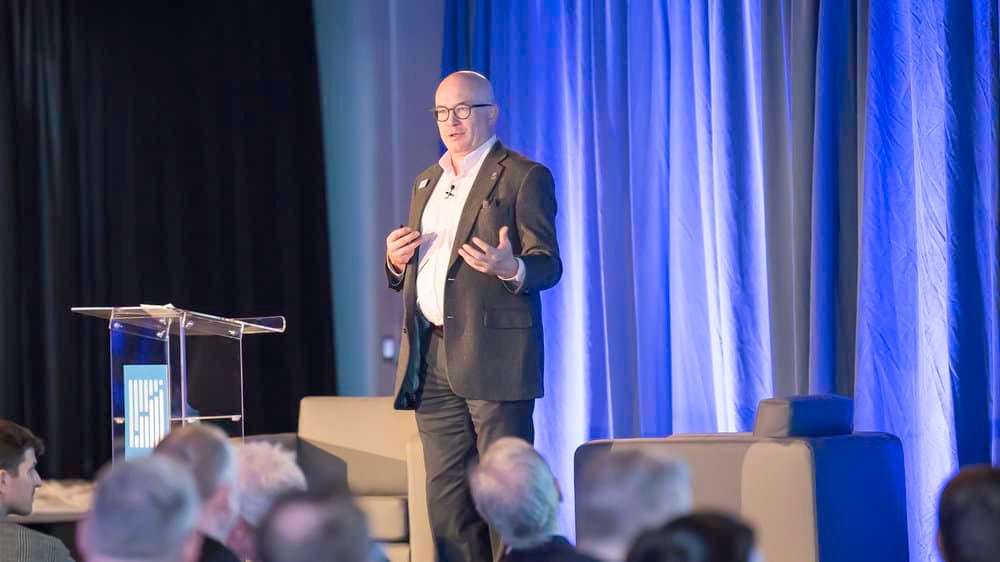FreightWaves founder and CEO Craig Fuller discusses the future of transportation with Alan Gershenhorn. ( Photo: FreightWaves )
On Thursday night, FreightWaves hosted a gathering of the transportation, logistics, and financial industries at its new headquarters ahead of the launch of the Trucking Freight Futures contracts on the Nodal Exchange Friday morning. Executives from local and national firms celebrated the arrival of freight futures a cocktail reception and dinner. Donald Broughton, principal at Broughton Capital, took the stage to put FreightWaves chief executive officer and founder Craig Fuller’s vision into context.
Broughton discussed breakthroughs in the history of capitalism that changed the world.
“Ideas change the world. Luca Pacioli documented what bankers in medieval Florence had figured out and wrote down the blueprint of double-entry accounting, which allowed people to understand better the value of a transaction,” Broughton began. “That discovery allowed Florence to dominate international finance for hundreds of years.”
Broughton told the story of Richard Sears and Alvah Roebuck who launched a retail company with the mission to “sell everything by mail order only,” and then noted how the duo pivoted to brick and mortar stores in the 1920s. On the FedEx’s first night of business, Fred Smith and his team used 14 planes to move and deliver 186 packages. The overarching theme of Broughton’s talk was the power of visionary ideas and how entrepreneurs adapt to changing market conditions and seize new opportunities.
Then Broughton pivoted to financially-settled freight futures contracts, a financial instrument that buyers and sellers of truckload capacity can use to de-risk their exposure to spot market volatility.
“Three years ago, in March the spot rate for truckload was down 16 percent year-over-year, then it went up 33 higher than the previous year,” Broughton said. “Are freight futures needed? Yeah. Hell yeah.”
 Donald Broughton talks about the power of visionary ideas to transform capitalism. ( Photo: FreightWaves )
Donald Broughton talks about the power of visionary ideas to transform capitalism. ( Photo: FreightWaves )
Later, Craig Fuller was joined on stage by UPS alum Alan Gershenhorn for a fireside chat. Gershenhorn spent 38 years at UPS in a wide variety of roles, helping transform the United States-based parcel carrier into a global logistics company. In the last phase of his career, Gershenhorn oversaw the acquisition and integration of Coyote Logistics, a $1.8 billion transaction that represented UPS’ largest ever acquisition. Last fall, Gershenhorn joined the advisory board of 8VC, the San Francisco-based venture capital firm that has invested in a portfolio of transportation technology companies, including project44, Platform Science, and FreightWaves.
After Gershenhorn recounted his career at UPS, Fuller asked him why it took one of the largest transportation companies in the world until 2015 to get into the truckload business.
“We looked at all the supply chain segments and freight markets outside of parcel,” Gershenhorn explained. “One of the reasons why it took so long is that we weren’t sure we would be able to establish a beachhead because of the fragmentation in trucking—when you’re UPS, you want to be number one or two or maybe three in every market you play in. We didn’t really understand asset-light at the time; we were always looking at truckload asset carriers, and there were labor implications you had to think through.”
Once UPS executives understood how asset-light freight brokerages could offer access to a “virtual” national fleet, Gershenhorn said, they became enamored with the space.
“We saw the asset utilization play,” Gershenhorn recounted, saying that a sophisticated brokerage operation allowed UPS to cube out its own trucks more efficiently, as well as those of its customers.
Other topics covered were Amazon (which Gershenhorn said was innovating much faster than other retailers and transportation companies) and autonomous vehicle technology (Gershenhorn said it would take 10 years for AVs to become ubiquitous).
To conclude the conversation, Fuller asked Gershenhorn what he’s most excited about in the transportation and logistics industry.
“With what’s happening, not just in our space, but in data analytics, the power of machines and data scientists, and take all those things, we look like Amazon in 1994,” Gershenhorn said. “We’re going to wake up 20 years later, and all this will have changed.”











